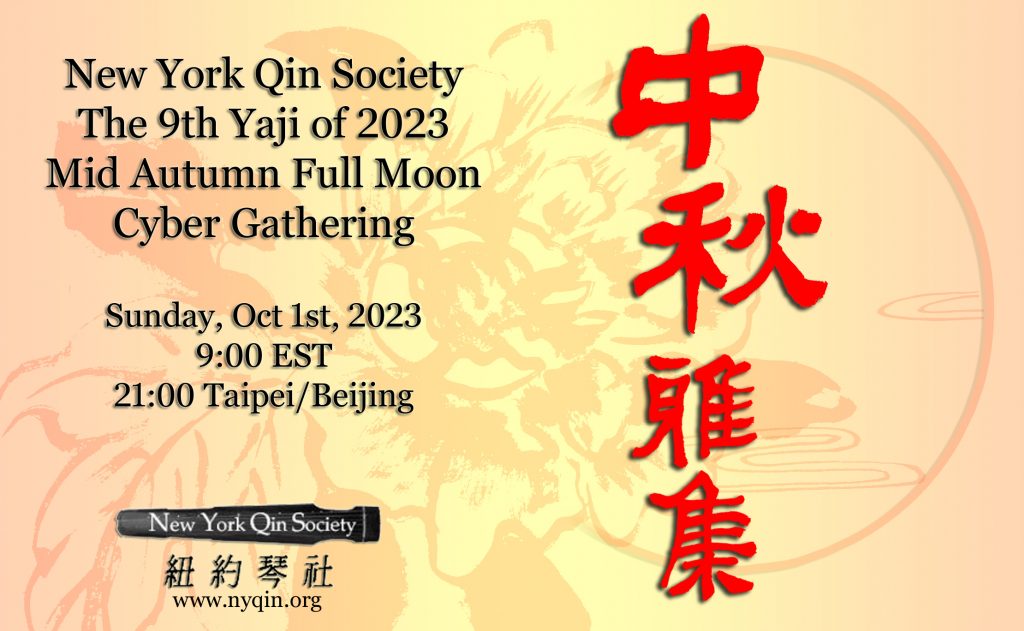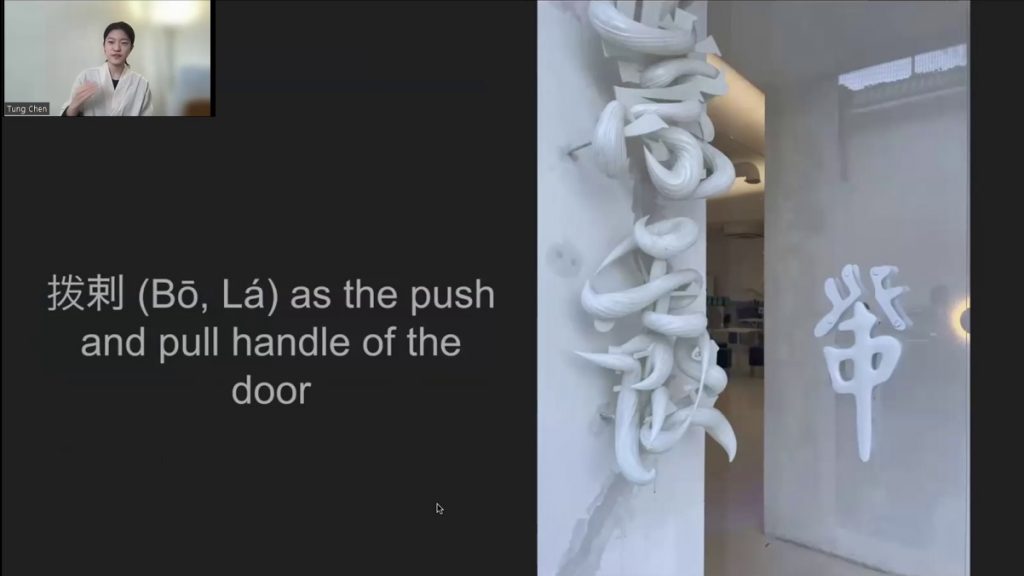Mid-Autumn Full Moon Cyber Gathering (Taipei/Beijing/New York) 中秋雅集

Date: Sunday, October 1, 2023
Time: 9:00 AM EST (21:00 Taipei/Beijing)
Location: Zoom
Program
(First hour) Live Stream Video 第一小時會議實況錄影: https://youtu.be/s0GMHgaLknI
1. Guest, Sarah Chen 陳麗如 from Taipei, greeted to everyone and performed ‘Shi Shang Liu Quan’ 石上流泉 (Spring Water Over Pebbles)
2. Guest, Andrey Danilov 袁安瑞 from Taipei, performed ‘Qiu Sai Yin’ 秋塞吟 (Autumn On The Frontier).
3. NYQS Founding President, Yuan Jung-Ping 袁中平 from Taipei, performed ‘Yu Ge’ 漁歌 (Fisherman Song) on a Qing Dynasty antique qin, and shared some closer shots of the antique Qin. He also shared his experiences from running the Taipei Qin Hall, which was officially closedon September 30, 2023
(Second hour to the 3rd hour)
4. Guest, Han Yining 韓一甯 from Beijing, performed the Meian Qin composition ‘Daoyi,’ 搗衣 (beating clothes while washing), also known as ‘Qiuchu Nong,’ 秋杵弄 (Autumn Pestle Song). He provided insights into the emotional aspects of the piece, its meaning, and the relationship between its form and content.
Live Stream Video of Yining’s presentation and chat 一甯的演奏與談話實況錄影 : https://youtu.be/CqVyk_ioNbY
Original Video of Yining’s Daoyi playing
5. Tung Chen 陳曈 performed ‘Liang Xiao Yin’ 良宵引 (Song of A Pleasant Night) and gave a brief report on her guqin trip to Taiwan (Taipei Qin Hall) and Beijing China (Zixia Qin Hall 紫霞琴院) during the summer.
Live Stream Video of Tung Chen’s performance of Liang Xiao Yin 陳曈演奏實況錄影: https://youtu.be/Dwbkp-7-3C4 (on silk strings)



Tung shared her impressions on the contrasting interior designs of Zixia Qin Hall and Taipei Qin Hall. One is very modern, while the other exudes a strong sense of antiquity due to its Japanese-style architecture, tatami flooring, and the practice of going shoeless indoors. She mentioned feeling a sense of calm and comfort in the latter.
6. André Ribeiro 林柏儒 provided a brief report on the London International Guqin Conference held on August 26 and 27 and performed ‘Pin Sha Luo Yan’ 平沙落雁 (Wild Geese Flock to Sandy Shores) .
Live Stream Video of André’s qin playing 林柏儒演奏實況錄影: https://youtu.be/N4vokqCmcUw
You can find a link to André’s report here.
7. John Thompson 唐世璋 couldn’t attend this meeting this day, but one can read his research and hear his playing of Mid-Autumn Moon 中秋月 here.
The meeting last for three hours with rich, interesting, and in-depth conversations.
Attendance
André Ribeiro, Marilyn Wong Gleysteen, Stephen Dydo, Mingmei Yip, Andrea Lioy, Tung Chen, Peiyou Chang, Yining Han 韓一甯, Jung Ping Yuan, 袁中平, Sarah Chen 陳麗如, Andrey Danilov 袁安瑞, Ralph Knag, Juni Yeung, Lawrence Kaster, Lisa Raphals, Mandy Zostek, Tracy Li 李沐恩, Hugo Andrés Forero, Jiefu Chen 陳玠甫
Feedback from Marilyn
It was a successful meeting and we look forward to welcoming Han Yining as a new member at our next meeting ! Hearing the reports on the London Youlan conference was very useful, and we hope even more so for those who actually attended in person, as in person meetings still have a consensus. Participation in these zoom Yaji is still central to NYQS, as we are no longer based in NY!!!
We welcome members’ after-the-meeting feedback !! Han Yining played a piece new to many of us, 搗衣, referring to the beating of the silk fabric after being woven, an act traditionally performed by women, left behind. Yining was interested in refining the character of the piece, and what makes a qin piece” happy” or “sad,” and how it arouses our emotions. He gave us background by referring to a classic Chinese film and a song from the 30s and wondered about tempo, dynamics and mode to determine the mood of a piece.
Thanks go to Peiyou, Ralph, André and members who participated today, such as Chen Tung, who presented pictures of the new contemporary Beijing qin music center and coffee shop that she visited. We were glad to hear her reactions to that hall as well as to her visiting Master Yuan Jung ping and seeing the Taipei Qin hall before it closes. Master Jung ping clarified the fact that he is not “retiring,” but continuing his work at a new hall entitled “The Dao is Not There, but Everywhere Hall,”不在道院 in the Yangming mountain district of Taipei City, while the original Taipei Qin Hall on Chi Tung street downtown is being renovated. That renovation process on an historic wood structure in Japanese style like the complex of buildings that constituted the museum, instructional and meeting place of their Society should be undertaken every decade, and twelve years have passed since Taipei Qin Hall first opened its doors.
Marilyn Wong Gleysteen, PhD 王妙蓮, Corresponding Secretary, NYQS
Feedback from Yining
I don’t think I explained clearly enough the connection in my presentation. Basically my conjecture is that 王燕卿 (founder of Mei’an school) was teaching the Qin during the early Republic era in Nanjing and his students most definitely had heard this style of Jiangsu folk song playing and it influenced their treatment of the Mei’an pieces. So, even if to us the pieces sound ‘happy,’ they might not have seemed so to the people interpreting these pieces in the 1930s, which is when the Mei’an tradition was more or less formed. 我認為我在演講中沒有清楚地解釋這種聯繫。基本上,我的猜測是,王燕卿(梅庵琴派的創始人)在民國早期在南京教授古琴,他與學生們肯定聽過像四季歌, 哭七七等江蘇民歌,這影響了他們對梅庵琴曲的演譯方式。因此,即使對我們來說這些曲目聽起來“愉快”,但在1930年代梅庵琴派傳統始成形的時候,當時彈這些曲目的人可能並不這麼認為。
Here is a link to a recording of Daoyi I made in 2020 which is in a more traditional tempo and play style: https://music.163.com/#/song?app_version=8.10.81&id=2020313051&fx-wechatnew=t4&sc=wm&dlt=0846
Feedback from Dan Reid
My apologies for missing Sunday’s yaji. Unfortunately, I didn’t check the program in advance so I didn’t realize it was really a “not-to-be-missed” event. I would have, otherwise, planned ahead to prevent last-minute issues.
I’m glad to hear that the Qin Hall will eventually be back in operation, and that Yuan Laoshi has a harmonious environment to continue cultivating qin and Dao and even welcome others to join him! Yining’s talk on Daoyi was insightful. I do find it helpful to be more aware of other Chinese musical influences to get a sense of folk rhythms and melodies. Folk music is so often dance music and so tends to be very rhythmic, and you can certainly hear a lilt and bounce behind many sections in guqin melodies. So there is that sort of yang of rhythmic momentum behind the more breathy space of guqin tempo. Also traditional Chinese rhythm’s often have an accent on the “and” or “a” beat (“1-e-and-a 2-e-and-a 3-e-and-a 4-e-and-a”) in a distinctively Chinese way, so listening to these rhythms helps me find more of the underlying movement in some guqin melodies.
Excellent performances, clear, graceful, and intentional.
Dan 10/3/2023
